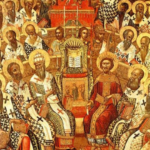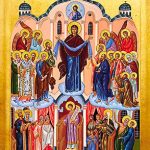by Fr. Jonathan H. Cholcher For Americans, voting in elections is a fundamental right and duty of citizenship. This duty is such a fundamental aspect of American government that American Christians, including the Orthodox, have incorporated voting into the routine management of their churches, for instance, at monthly Parish Council meetings, annual Voters’ Meetings, and church-wide assemblies. Voting is an accepted tool for exercising the faith. In the truest Christian sense, voting should be guided by faith because faith ultimately … [Read more...]
Weekly Bulletin November 3, 2024
Weekly Bulletin October 27, 2024
Lessons from the Storm
by Fr. Jonathan H. Cholcher The first century Christian catechism called The Teaching (Gk., Didache) contains the following spiritual law: “Welcome activities occurring to you as good knowing that nothing happens apart from God” (3.10). Our Lord says, “God the Father makes His sun rise on the evil and on the good, and sends rain on the just and the unjust”; then, later: “Are not two sparrows sold for a copper coin? And not one of them falls to the ground apart from your Father’s will. But the very hairs of your head are all numbered. Do … [Read more...]
Weekly Bulletin October 20, 2024
Weekly Bulletin October 13, 2024
Weekly Bulletin October 6, 2024
Weekly Bulletin September 29, 2024
Weekly Bulletin September 22, 2024
Sunday Bulletin September 15, 2024
- « Previous Page
- 1
- …
- 9
- 10
- 11
- 12
- 13
- …
- 22
- Next Page »










